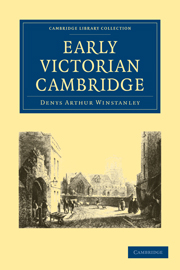Book contents
- Frontmatter
- Contents
- Preface
- Chapter I THE FOUNDATION OF DOWNING COLLEGE
- Chapter II A COLLEGE ELECTION
- Chapter III UNDERGRADUATES IN BONDS
- Chapter IV THE ATTACK ON HEADS OF HOUSES
- Chapter V CHRISTOPHER WORDSWORTH
- Chapter VI THE RELIGIOUS TESTS
- Chapter VII CHANCELLORS AND HIGH STEWARDS
- Chapter VIII TOWN AND GOWN
- Chapter IX TROUBLE AT THE FITZ WILLIAM
- Chapter X INTERNAL REFORM
- Chapter XI THE ROYAL COMMISSION
- Chapter XII BETWEEN THE TWO COMMISSIONS
- Chapter XIII STATUTE XLI AND THE THREE REGIUS PROFESSORSHIPS
- Chapter XIV THE STATUTORY COMMISSION AND THE UNIVERSITY
- Chapter XV THE STATUTORY COMMISSIONERS AND TRINITY COLLEGE
- Chapter XVI CAMBRIDGE AS IT WAS
- Appendices
- Index
Chapter VIII - TOWN AND GOWN
Published online by Cambridge University Press: 07 September 2010
- Frontmatter
- Contents
- Preface
- Chapter I THE FOUNDATION OF DOWNING COLLEGE
- Chapter II A COLLEGE ELECTION
- Chapter III UNDERGRADUATES IN BONDS
- Chapter IV THE ATTACK ON HEADS OF HOUSES
- Chapter V CHRISTOPHER WORDSWORTH
- Chapter VI THE RELIGIOUS TESTS
- Chapter VII CHANCELLORS AND HIGH STEWARDS
- Chapter VIII TOWN AND GOWN
- Chapter IX TROUBLE AT THE FITZ WILLIAM
- Chapter X INTERNAL REFORM
- Chapter XI THE ROYAL COMMISSION
- Chapter XII BETWEEN THE TWO COMMISSIONS
- Chapter XIII STATUTE XLI AND THE THREE REGIUS PROFESSORSHIPS
- Chapter XIV THE STATUTORY COMMISSION AND THE UNIVERSITY
- Chapter XV THE STATUTORY COMMISSIONERS AND TRINITY COLLEGE
- Chapter XVI CAMBRIDGE AS IT WAS
- Appendices
- Index
Summary
The Royal Commission, appointed in 1850 to enquire into the discipline, studies and revenues of the University and colleges, received a memorial from the Cambridge Borough Council, complaining of the exercise by the University of certain antiquated privileges, and of the “total or partial exemption of the University and colleges therein from certain local burthens”. Most of the grievances advanced were of long standing, and there is no doubt that, if there had been good will on both sides, several of them would have been redressed long before. But, unfortunately, the relations between Town and Gown were extremely hostile. The University was never reluctant to cause annoyance to the Town, and the Town was always on the outlook for an opportunity to humiliate the University. Consequently certain privileges, which had ceased to serve any other purpose than provoking the resentment of the Town, were particularly dear to the University, and others, which were really needed to enable the University to discharge its responsibilities, were not on that account the less disliked by the Town. Hence the memorial to the Commissioners was inevitably a partisan statement, disfigured by inaccuracies, exaggerations and prejudice; but the case it presented, though not as strong as its framers believed, was certainly weighty and deserving of careful consideration.
- Type
- Chapter
- Information
- Early Victorian Cambridge , pp. 122 - 138Publisher: Cambridge University PressPrint publication year: 2009First published in: 1940

